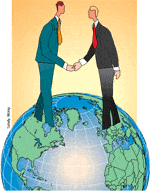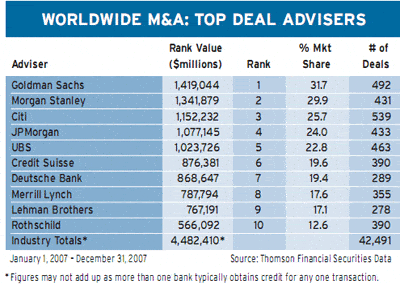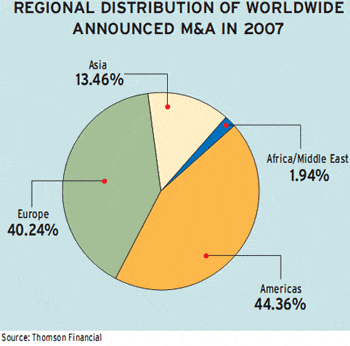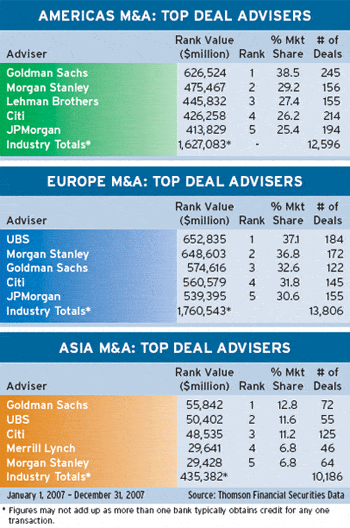Mergers & Acquisitions
 Cross-border mergers and acquisitions accounted for a record 47% of worldwide M&A; transactions in 2007, as global consolidation continued to drive merger activity in the materials, financials, and energy and power sectors, according to Thomson Financial.
Cross-border mergers and acquisitions accounted for a record 47% of worldwide M&A; transactions in 2007, as global consolidation continued to drive merger activity in the materials, financials, and energy and power sectors, according to Thomson Financial.
Cross-border volume involving US-based target companies increased steadily throughout the year as the dollar weakened, making US companies more attractive takeover targets or investments by foreign buyers. US inbound volume more than doubled during the fourth quarter of 2007 compared to the same period a year earlier.
Elsewhere, Australia-based mining company BHP Billiton’s $145 billion bid for Rio Tinto, based in the United Kingdom, ranks as the second-biggest deal of all time. Rio Tinto rejected BHP Billiton’s proposed all-share offer shortly after it was announced last November, but BHP is persevering with its approach.
Merger activity in the financials sector accounted for 16% of merger activity in 2007, led by the takeover of Netherlands-based ABN AMRO by a consortium led by the Royal Bank of Scotland, which ranks as the biggest financial merger on record. Santander of Spain and Belgian-Dutch banking and insurance firm Fortis were the other members of the buying group.
Worldwide M&A; Rises 24%
Worldwide M&A; reached a record $4.5 trillion in announced deals in 2007, a 24% increase over the previous record set in 2006, according to Thomson Financial, a provider of information and technology to the financial community. “Despite a dramatic falloff in merger activity caused by concerns in the credit markets in the third quarter of 2007, fourth-quarter activity rebounded to surpass the $1 trillion mark amid strong strategic activity and a flurry of cross-border investments by Middle Eastern and Asian investors,” Thomson Financial said in its review of M&A; activity in 2007.
M&A; activity in Europe rose 36% last year to $1.8 trillion, surpassing the total for the United States for the first time since 2002.
Goldman Sachs topped the league tables for financial advisers on worldwide M&A; deals announced in 2007. Goldman had a big lead in the industrials sector and ranked a close second to Morgan Stanley in the financials sector. Morgan Stanley finished second in the global financial adviser rankings, followed by Citi, JPMorgan and UBS.
Mergers in the industrials sector led all industry groups by number, with more than 5,600 deals announced worldwide last year.
On a regional basis, Goldman Sachs was the leading financial adviser on announced deals in the Americas last year, and Morgan Stanley was the leader in Europe. UBS was the top financial adviser in the Asia ex-Japan region, while Nomura led the league tables in Japan.
 Private Equity Deals Slump
Private Equity Deals Slump The credit market crisis had a big impact on deals by private equity firms or financial sponsors in 2007, which still accounted for more than $872 billion in announced deals, or 19.5% of the overall annual volume. However, only one such transaction of more than $5 billion was announced after July, as against 32 deals above $5 billion each during the first seven months of 2007. Financial sponsors accounted for just 9% of announced transactions during the fourth quarter of 2007, the lowest quarterly level since the first quarter of 2004, according to Thomson Financial.
Private equity firm Cerberus Capital Management agreed on December 24 to pay United Rentals a $100 million breakup fee for scrapping its $4 billion purchase of the Greenwich, Connecticut-based equipment-rental company. United Rentals took Cerberus to court for walking away from the deal, but a Delaware court ruled that the private equity firm was allowed to abandon the takeover.
Student lender Sallie Mae has also gone to court in Delaware to try to collect a $900 million breakup fee from private equity firm JC Flowers.
Mezzanine Funds Formed
As bonds and loans to finance leveraged buyouts have dried up, many securities firms are forming mezzanine funds to make loans to companies at higher rates than banks and buy their preferred stock. Mezzanine debt is secured only by the equity of the company and not by the company’s tangible assets, such as property, cash and accounts receivable.
Goldman Sachs is raising $20 billion for the biggest mezzanine fund. Los Angeles-based TCW is raising $4.5 billion to be split between two funds. New York Life Capital raised $800 million in November for its second mezzanine fund.
With the dollar sinking, foreign companies will tend to use cash on hand instead of leveraged buyouts or other financing vehicles to acquire or invest in US-based companies, according to a report by middle-market investment bank Trenwith Securities. In addition, US companies will still be hesitant to receive stock as payment, considering that many Asian exchanges are trading at unsustainable multiples, according to Trenwith. The firm has 10 US offices that provide access to global markets through a network of 600 independent member-firm offices of BDO International, including a significant presence in China.
Buyout Firms’ Fees Drop
Buyout firms paid $5.4 billion to securities firms in the US and Europe in the second half of 2007, a decline of 38% from the first half of last year, according to New York-based research firm Freeman. The decline was centered in Europe, where such fees fell 54% in the second half of 2007. The $19.4 billion acquisition of Alliance Boots by KKR and Stefano Pessina was the largest financial-sponsored M&A; deal in Europe last year.
Although financial-sponsor activity slowed dramatically in the last six months of last year, US financial-sponsor volume increased by 7.1% year-over-year and accounted for 29% of US mergers and acquisitions in 2007, according to Thomson Financial. The credit crunch was the main reason for the second-half slowdown, it said.
Meanwhile, government-owned investment funds are becoming more active participants in M&A; transactions. Simon Johnson, economic counselor and director of the International Monetary Fund’s research department, says these sovereign wealth funds are not likely to go away. “Such funds are based on current account surpluses and will become less important only if countries with large surpluses begin to run prolonged current account deficits,” he says.
The credit market crisis had a big impact on deals by private equity firms or financial sponsors in 2007, which still accounted for more than $872 billion in announced deals, or 19.5% of the overall annual volume. However, only one such transaction of more than $5 billion was announced after July, as against 32 deals above $5 billion each during the first seven months of 2007. Financial sponsors accounted for just 9% of announced transactions during the fourth quarter of 2007, the lowest quarterly level since the first quarter of 2004, according to Thomson Financial.Private equity firm Cerberus Capital Management agreed on December 24 to pay United Rentals a $100 million breakup fee for scrapping its $4 billion purchase of the Greenwich, Connecticut-based equipment-rental company. United Rentals took Cerberus to court for walking away from the deal, but a Delaware court ruled that the private equity firm was allowed to abandon the takeover.Student lender Sallie Mae has also gone to court in Delaware to try to collect a $900 million breakup fee from private equity firm JC Flowers.As bonds and loans to finance leveraged buyouts have dried up, many securities firms are forming mezzanine funds to make loans to companies at higher rates than banks and buy their preferred stock. Mezzanine debt is secured only by the equity of the company and not by the company’s tangible assets, such as property, cash and accounts receivable. Goldman Sachs is raising $20 billion for the biggest mezzanine fund. Los Angeles-based TCW is raising $4.5 billion to be split between two funds. New York Life Capital raised $800 million in November for its second mezzanine fund.With the dollar sinking, foreign companies will tend to use cash on hand instead of leveraged buyouts or other financing vehicles to acquire or invest in US-based companies, according to a report by middle-market investment bank Trenwith Securities. In addition, US companies will still be hesitant to receive stock as payment, considering that many Asian exchanges are trading at unsustainable multiples, according to Trenwith. The firm has 10 US offices that provide access to global markets through a network of 600 independent member-firm offices of BDO International, including a significant presence in China. Buyout firms paid $5.4 billion to securities firms in the US and Europe in the second half of 2007, a decline of 38% from the first half of last year, according to New York-based research firm Freeman. The decline was centered in Europe, where such fees fell 54% in the second half of 2007. The $19.4 billion acquisition of Alliance Boots by KKR and Stefano Pessina was the largest financial-sponsored M&A; deal in Europe last year.Although financial-sponsor activity slowed dramatically in the last six months of last year, US financial-sponsor volume increased by 7.1% year-over-year and accounted for 29% of US mergers and acquisitions in 2007, according to Thomson Financial. The credit crunch was the main reason for the second-half slowdown, it said.Meanwhile, government-owned investment funds are becoming more active participants in M&A; transactions. Simon Johnson, economic counselor and director of the International Monetary Fund’s research department, says these sovereign wealth funds are not likely to go away. “Such funds are based on current account surpluses and will become less important only if countries with large surpluses begin to run prolonged current account deficits,” he says.
 Investing Dollar Reserves
Investing Dollar Reserves Dollar reserves worldwide are immense, says Jonathan Auerbach, co-founder and managing director of New York-based Auerbach Grayson, a broker for institutional investors in global markets. Auerbach also is chairman of AXES, a platform for executing and routing global equity order flows in 107 countries.
China’s foreign exchange reserves rose to $1.53 trillion at the end of 2007, up 43% from the end of the previous year, the country’s central bank said.
“Sovereign wealth funds are investing heavily in Africa and the Middle East,” Auerbach says. As long as oil prices stay high, these sovereign funds will continue to be active investors, he says.
Sovereign funds have invested more than $29 billion in Merrill Lynch, Citi, Bear Stearns, UBS and Morgan Stanley. Wall Street firms are expected to seek additional cash infusions from foreign-government-owned investment vehicles to offset writedowns on mortgage-related investments and bolster their capital positions.
An investor group composed of the Government of Singapore Investment Corporation and an undisclosed investor agreed in December to acquire a 9% stake in Zurich-based investment bank UBS for $11.5 billion. China Investment Corporation, an arm of the Chinese government, invested $5 billion in December for equity units that convert into as much as 9.9% of Morgan Stanley common stock.
Merrill Lynch received a $4.4 billion investment from Singapore’s state-run Temasek Holdings in December and said it would also sell $1.2 billion in stock to private equity firm Davis Selected Advisors.
Last November the Abu Dhabi Investment Authority agreed to acquire a 4.9% stake in Citi for $7.5 billion. In October Bear Stearns agreed to a $1 billion cross-investment from China’s government-controlled Citic Securities.
Outlook Remains Bleak
“Writedowns and losses will continue to mount,” William Tanona, analyst at Goldman Sachs, said in a research report on financial institutions last month. Raising more money from sovereign funds will be capital-raising exercises for some Wall Street firms and self-preservation for others, he said.
Meanwhile, Bank of America announced in January that it agreed to pay about $4 billion in stock to acquire Countrywide Financial, based in Calabasas, California. It acquired the troubled mortgage lender at a steep discount.
“Countrywide represents a rare opportunity for Bank of America to add what we believe is the best domestic mortgage platform at an attractive price and to affirm our position as the nation’s premier lender to consumers,” Kenneth Lewis, Bank of America’s chairman and chief executive officer, said in a statement.
Bank of America invested $2 billion in Countrywide’s preferred stock last August, which gave it a 16% stake in the largest originator and servicer of mortgages in the US.
Dollar reserves worldwide are immense, says Jonathan Auerbach, co-founder and managing director of New York-based Auerbach Grayson, a broker for institutional investors in global markets. Auerbach also is chairman of AXES, a platform for executing and routing global equity order flows in 107 countries.China’s foreign exchange reserves rose to $1.53 trillion at the end of 2007, up 43% from the end of the previous year, the country’s central bank said.“Sovereign wealth funds are investing heavily in Africa and the Middle East,” Auerbach says. As long as oil prices stay high, these sovereign funds will continue to be active investors, he says.Sovereign funds have invested more than $29 billion in Merrill Lynch, Citi, Bear Stearns, UBS and Morgan Stanley. Wall Street firms are expected to seek additional cash infusions from foreign-government-owned investment vehicles to offset writedowns on mortgage-related investments and bolster their capital positions.An investor group composed of the Government of Singapore Investment Corporation and an undisclosed investor agreed in December to acquire a 9% stake in Zurich-based investment bank UBS for $11.5 billion. China Investment Corporation, an arm of the Chinese government, invested $5 billion in December for equity units that convert into as much as 9.9% of Morgan Stanley common stock.Merrill Lynch received a $4.4 billion investment from Singapore’s state-run Temasek Holdings in December and said it would also sell $1.2 billion in stock to private equity firm Davis Selected Advisors.Last November the Abu Dhabi Investment Authority agreed to acquire a 4.9% stake in Citi for $7.5 billion. In October Bear Stearns agreed to a $1 billion cross-investment from China’s government-controlled Citic Securities.“Writedowns and losses will continue to mount,” William Tanona, analyst at Goldman Sachs, said in a research report on financial institutions last month. Raising more money from sovereign funds will be capital-raising exercises for some Wall Street firms and self-preservation for others, he said.Meanwhile, Bank of America announced in January that it agreed to pay about $4 billion in stock to acquire Countrywide Financial, based in Calabasas, California. It acquired the troubled mortgage lender at a steep discount.“Countrywide represents a rare opportunity for Bank of America to add what we believe is the best domestic mortgage platform at an attractive price and to affirm our position as the nation’s premier lender to consumers,” Kenneth Lewis, Bank of America’s chairman and chief executive officer, said in a statement.Bank of America invested $2 billion in Countrywide’s preferred stock last August, which gave it a 16% stake in the largest originator and servicer of mortgages in the US.
 Big Industrial Merger
Big Industrial Merger The largest M&A; transaction in the Americas region announced in December was Ingersoll Rand’s bid for air-conditioner manufacturer Trane. Both companies are based in New Jersey. Thomson Financial gave the deal a rank value of more than $11.5 billion. Ingersoll Rand makes industrial machinery and equipment, transports food and provides security for homes and businesses.
“This acquisition represents a significant next step in Ingersoll Rand’s decade-long transformation to become a leading global diversified industrial company, with strong market positions across the climate-control, industrial and security markets,” Herbert Henkel, Ingersoll Rand chairman, president and chief executive said. “The acquisition of Trane meets our long-term objectives of significantly increasing consistency of revenue and income streams, adding strong brands and market positions, and further strengthening the organic growth potential of our portfolio,” he said.
Trane, formerly American Standard, has more than 29,000 employees and 29 production facilities worldwide. Ingersoll Rand has 35,000 employees and 80 manufacturing facilities around the world. Credit Suisse, Goldman.
The largest M&A; transaction in the Americas region announced in December was Ingersoll Rand’s bid for air-conditioner manufacturer Trane. Both companies are based in New Jersey. Thomson Financial gave the deal a rank value of more than $11.5 billion. Ingersoll Rand makes industrial machinery and equipment, transports food and provides security for homes and businesses.“This acquisition represents a significant next step in Ingersoll Rand’s decade-long transformation to become a leading global diversified industrial company, with strong market positions across the climate-control, industrial and security markets,” Herbert Henkel, Ingersoll Rand chairman, president and chief executive said. “The acquisition of Trane meets our long-term objectives of significantly increasing consistency of revenue and income streams, adding strong brands and market positions, and further strengthening the organic growth potential of our portfolio,” he said.Trane, formerly American Standard, has more than 29,000 employees and 29 production facilities worldwide. Ingersoll Rand has 35,000 employees and 80 manufacturing facilities around the world. Credit Suisse, Goldman.





Gordon Platt



